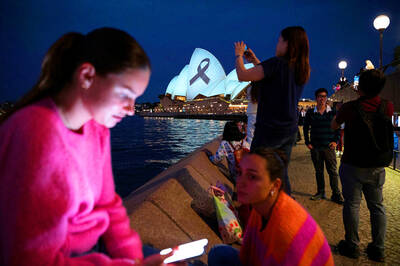As Hong Kong sees life change rapidly under a new security law, protesters have quickly learned that actions that were not worthy of police attention a little more than a week ago could now warrant an arrest, DNA sample and search of their home — in addition to the possibility of jail time.
Hong Kong police made their first arrests last week under a sweeping new security law imposed by China, taking 10 protesters into custody. Six men and four women, aged 15 to 67, were arrested due to acts of inciting or abetting subversion or secession, police said.
At least six possessed pro-democracy and independence pamphlets and poster bills that have been distributed during past demonstrations without triggering arrests, lawyers representing the protesters said.
Police collected DNA samples from them and searched their homes — both rare occurrences, if ever, in more than a year of pro-democracy demonstrations in the territory, said Janet Pang (彭皓昕), a lawyer for several of the protesters.
Over the past 12 months, the protests have at times paralyzed the semi-autonomous Chinese territory.
Hundreds of people have been detained, had their mobile phones confiscated and, in some cases, the information stored on them collected.
Pang said she believes it is the first time genetic data has been taken from protesters arrested for minor offenses.
“It is unnecessary, intrusive and disproportionate,” she said. “I don’t know why they had to take DNA samples. We don’t know what kind of database they’re trying to build which might be sent back to the central government in Beijing.”
Since its introduction last week, the legislation has sent a shudder through free speech proponents, and prompted activists to dissolve political groups and shut down social media accounts.
Hong Kong on Monday asserted sweeping new police powers — from warrant-less searches to online surveillance to property seizures — that risk spooking businesses.
Hong Kong police have had the authority to collect DNA samples for more than a decade, but it was typically only used in assault or drug cases, Pang said.
The few protesters who had DNA samples taken from them by police had been charged with more serious offenses, including weapons possession and attempted arson, she said.
The move is a show of force from Beijing, which drafted the new security law behind closed doors, leaving residents of Hong Kong bracing for its impact and confused about how it will be applied.
China already uses DNA data to keep track of its Uighur population, something critics say is used for racial profiling and systemic discrimination against the ethnic group.
It also represents a challenge to the protesters’ efforts to remain anonymous — which has included wearing masks or destroying surveillance cameras — to avoid retribution at their jobs or schools.
“It seems to be uncalled for,” said Charles Mok (莫乃光), a Hong Kong legislator who represents the technology industry, who described the taking of DNA samples as “almost unheard of.”
“The purpose of the collection is unclear, and given the often arbitrary nature of these arrests in recent months, such collection and possibly permanent storage of DNA data is worrisome and lacks oversight,” Mok said.
Asked to explain the purpose of collecting the DNA data on protesters, Hong Kong Chief Executive Carrie Lam’s (林鄭月娥) office directed all inquiries to the Hong Kong police.
Police said that under existing law, officials have the authority to take “non-intimate” samples of DNA from the 10 who were arrested this week.
The police said the samples were taken to prove — or disprove — that those arrested had committed the offenses.
A spokesperson declined to elaborate.
Pang said the new law has emboldened Hong Kong’s police.
When she complained about the swabs, she said police officials told her to ask for a judicial review if she was unhappy.
“The police think they have this new powerful weapon, this new law to do whatever they like,” she said.
Because of its newness and the broadness of its language, Hong Kong’s lawyers will struggle with its application, she said.

Republican US lawmakers on Friday criticized US President Joe Biden’s administration after sanctioned Chinese telecoms equipment giant Huawei unveiled a laptop this week powered by an Intel artificial intelligence (AI) chip. The US placed Huawei on a trade restriction list in 2019 for contravening Iran sanctions, part of a broader effort to hobble Beijing’s technological advances. Placement on the list means the company’s suppliers have to seek a special, difficult-to-obtain license before shipping to it. One such license, issued by then-US president Donald Trump’s administration, has allowed Intel to ship central processors to Huawei for use in laptops since 2020. China hardliners

Conjoined twins Lori and George Schappell, who pursued separate careers, interests and relationships during lives that defied medical expectations, died this month in Pennsylvania, funeral home officials said. They were 62. The twins, listed by Guinness World Records as the oldest living conjoined twins, died on April 7 at the Hospital of the University of Pennsylvania, obituaries posted by Leibensperger Funeral Homes of Hamburg said. The cause of death was not detailed. “When we were born, the doctors didn’t think we’d make 30, but we proved them wrong,” Lori said in an interview when they turned 50, the Philadelphia Inquirer reported. The

RAMPAGE: A Palestinian man was left dead after dozens of Israeli settlers searching for a missing 14-year-old boy stormed a village in the Israeli-occupied West Bank US President Joe Biden on Friday said he expected Iran to attack Israel “sooner, rather than later” and warned Tehran not to proceed. Asked by reporters about his message to Iran, Biden simply said: “Don’t,” underscoring Washington’s commitment to defend Israel. “We are devoted to the defense of Israel. We will support Israel. We will help defend Israel and Iran will not succeed,” he said. Biden said he would not divulge secure information, but said his expectation was that an attack could come “sooner, rather than later.” Israel braced on Friday for an attack by Iran or its proxies as warnings grew of

A prominent Christian leader has allegedly been stabbed at the altar during a Mass yesterday in southwest Sydney. Bishop Mar Mari Emmanuel was saying Mass at Christ The Good Shepherd Church in Wakeley just after 7pm when a man approached him at the altar and allegedly stabbed toward his head multiple times. A live stream of the Mass shows the congregation swarm forward toward Emmanuel before it was cut off. The church leader gained prominence during the COVID-19 pandemic, amassing a large online following, Officers attached to Fairfield City police area command attended a location on Welcome Street, Wakeley following reports a number